What to Do If Your Toddler’s Teeth Are Rotting

What to Do If Your Toddler’s Teeth Are Rotting Reviewed by Dr. Kalpesh Patel 5 min Read Tooth decay in toddlers, often called baby bottle tooth decay, is a serious concern. If your child’s teeth appear brown, black, or have visible cavities, early intervention is crucial. Here’s what you should do: 1. Schedule a Pediatric Dental Visit Immediately A pediatric dentist can assess the severity of the decay and recommend treatment options, such as fluoride treatments, fillings, or crowns. Early intervention can prevent pain and infection. 2. Improve Oral Hygiene Habits Brush twice a day with a soft-bristled toothbrush and fluoride toothpaste (use a rice-sized amount for children under three). Floss daily if your toddler has teeth that touch. Wipe gums with a clean cloth if they still have some baby teeth coming in. 3. Adjust Their Diet Limit sugary drinks and snacks like juice, candy, and soda. Avoid bedtime bottles with milk or juice—water is the best option. Encourage water drinking after meals to rinse away food particles. 4. Consider Fluoride Treatments Fluoride helps strengthen enamel and prevent further decay. Your dentist may recommend fluoride varnishes or supplements if necessary. 5. Watch for Signs of Pain or Infection If your child complains of pain, has swelling, or shows difficulty eating, it could indicate a more severe issue. Seek immediate dental care to prevent complications. In Conclusion Toddler tooth decay is preventable and treatable with proper oral care and professional help. If you notice signs of rotting teeth, visit Active Dental Prosper for expert pediatric dental care
What to Expect After Full Arch Dental Implants
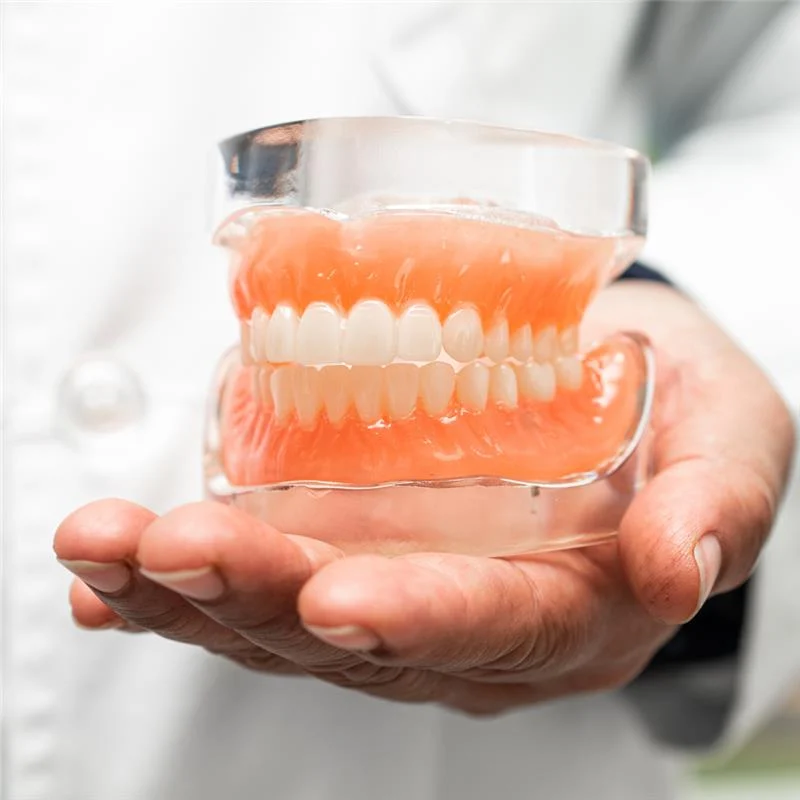
What to Expect After Full Arch Dental Implants Reviewed by Dr. Kalpesh Patel 5 min Read Getting full arch dental implants is a life-changing procedure that restores your smile, confidence, and ability to eat comfortably. But what happens after surgery? Here’s a breakdown of what to expect during recovery and how to ensure a smooth healing process. Immediate Post-Surgery Effects Right after the procedure, you may experience: Swelling & Bruising – This is normal and usually peaks within 48 hours. Applying an ice pack can help. Mild Bleeding – Some bleeding is expected for the first 24 hours but should gradually decrease. Discomfort or Soreness – Pain is manageable with prescribed or over-the-counter medications. Healing Timeline & Adjustments First Week – Stick to soft foods, follow oral hygiene instructions, and avoid smoking or alcohol. 1-2 Weeks – Stitches dissolve or get removed, swelling subsides, and discomfort lessens. 3-6 Months – The implants integrate with your jawbone (osseointegration), creating a solid foundation. Final Restorations – Once healing is complete, your permanent teeth are placed, giving you a fully functional smile. Long-Term Care & Maintenance Maintain good oral hygiene with brushing, flossing, and professional cleanings. Avoid hard foods that could damage your prosthetic teeth. Schedule regular dental check-ups to ensure long-term success. Ready for a New Smile? Visit Active Dental prosper At Active Dental Prosper, we specialize in full arch dental implants to help you regain a confident, natural-looking smile.
How to Remove Teeth Stains for Kids

How to Remove Teeth Stains for Kids Reviewed by Dr. Kalpesh Patel 5 min Read Teeth stains in children are common and can result from food, drinks, poor oral hygiene, or even medication. Luckily, there are simple and effective ways to keep your child’s teeth bright and clean. Causes of Teeth Stains in Kids Poor Brushing Habits – Plaque buildup can lead to discoloration. Certain Foods & Drinks – Berries, soda, and colored juices can stain teeth. Fluorosis – Too much fluoride can cause white or brown spots. Medications – Some antibiotics may lead to teeth discoloration. Enamel Defects – Weak enamel can stain more easily. Ways to Remove Teeth Stains 1. Encourage Proper Brushing Teach kids to brush twice daily using fluoride toothpaste. A soft-bristled toothbrush is best for gentle cleaning. 2. Floss Daily Flossing removes plaque between teeth, preventing stains and cavities. 3. Use a Child-Safe Whitening Toothpaste Some kid-friendly toothpaste options help remove surface stains while being gentle on enamel. 4. Try Baking Soda Brushing with a little baking soda (once a week) can naturally brighten teeth. 5. Avoid Staining Foods & Drinks Reduce intake of dark-colored juices, sodas, and sticky sweets. Encourage water after meals to rinse teeth. 6. Professional Cleaning If stains persist, a dentist can perform a gentle cleaning to remove discoloration safely. Conclusion Keeping your child’s teeth stain-free is easy with good oral hygiene and regular dental visits. If stains persist, consult a dentist to ensure there are no underlying issues. For expert dental care, visit Active Dental Prosper and keep your child’s smile bright!
Do Teeth Cleanings in Prosper Damage Tooth Enamel?
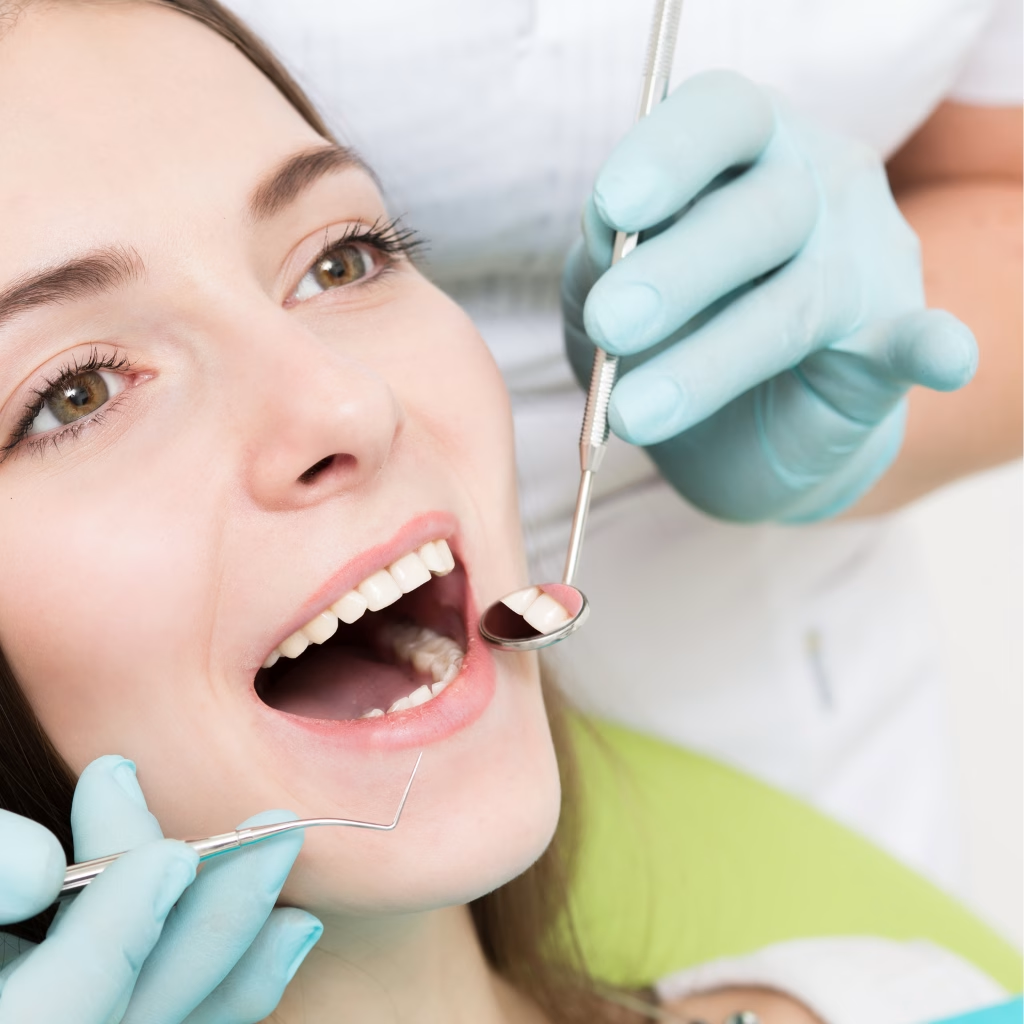
Do teeth cleanings damage tooth enamel? Reviewed by Dr. Kalpesh Patel 5 min Read Many people worry that professional teeth cleanings will wear down or damage their tooth enamel. Enamel is the protective outer layer of your teeth, so it’s natural to be concerned about its safety. Let’s clear up this myth and understand why regular teeth cleanings are essential to your oral health. Do teeth cleanings damage tooth enamel? No, professional teeth cleaning will not damage tooth enamel. Tooth enamel is the hardest substance in the human body, even stronger than bone. Teeth Cleaning is done carefully using special instruments that remove plaque and tartar without damaging tooth enamel. Plaque is a sticky film of bacteria that forms on the teeth and hardens into tartar if left untreated. Tartar cannot be removed by regular brushing and therefore requires professional cleaning. If plaque and tartar are not removed, over time it can lead to cavities, gum disease and loss of tooth enamel. When does tooth enamel become weak? While professional teeth cleaning is safe, tooth enamel can be damaged by: Vigorous brushing : Brushing too hard or using a toothbrush with hard bristles gradually wears away tooth enamel. Acidic foods and drinks: Foods that contain citrus fruits, soda and vinegar can weaken tooth enamel over time. Bruxism (teeth grinding) –: Regular teeth grinding can wear down tooth enamel and increase tooth sensitivity. Poor oral hygiene: Neglecting brush and floss can allow bacteria to grow, leading to cavities and enamel loss. How to protect tooth enamel after a cleaning Follow these tips to keep your tooth enamel strong and healthy after a professional cleaning: Use a soft-bristled toothbrush: Brushing gently with a soft-bristled toothbrush will protect your tooth enamel. Avoid acidic foods and drinks: If you eat acidic foods, rinse your mouth with water after eating. Stay hydrated: Drinking enough water helps wash away bacteria and maintain saliva production, naturally protecting your teeth. Use fluoride toothpaste: Fluoride strengthens tooth enamel and prevents cavities. Conclusion Teeth cleaning is safe and essential to maintaining a healthy smile. Rather than damaging tooth enamel, they help prevent cavities, gum disease and other dental problems. Contact Active Dental Prosper for professional teeth cleaning and comprehensive oral care. Keep your smile healthy and strong with professional care!
The Right Time for Your Child’s First Dental Visit
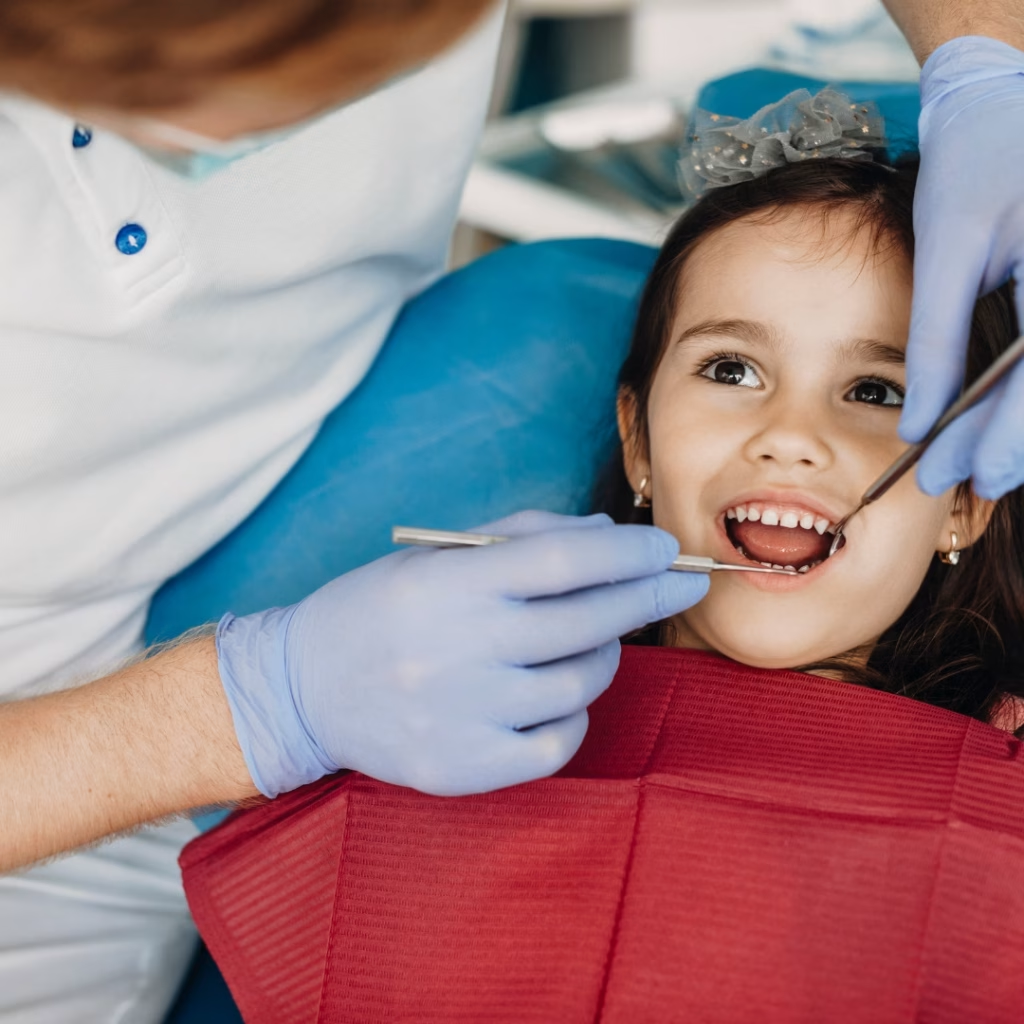
The Right Time for Your Child’s First Dental Visit Reviewed by Dr. Kalpesh Patel 5 min Read Ensuring your child’s or4al health from an early age is essential for a lifetime of healthy smiles. One common question parents ask is: When should my child have their first dental visit? The answer might be earlier than you think! Best Age for Your Child’s First Dental Visit The American Academy of Pediatric Dentistry (AAPD) recommends that children visit the dentist by their first birthday or within six months of their first tooth appearing—whichever comes first. Early visits help detect potential dental issues before they become serious. Why Early Dental Visits Are Important Prevents Early Tooth Decay – Baby teeth play a crucial role in your child’s development. A dentist can help prevent cavities and ensure proper oral hygiene. Builds Positive Dental Habits – Starting early teaches kids the importance of regular dental checkups and proper brushing techniques. Reduces Dental Anxiety – Children who visit the dentist early feel more comfortable with dental care, leading to stress-free future visits. What to Expect During the First Visit What Happens at Your Child’s First Dental Visit? Examine their teeth, gums, and jaw development. Check for signs of early decay or teething concerns. Provide tips on brushing, flossing, and nutrition. Discuss fluoride treatments and cavity prevention. Regular dental visits with a Pediatric Dental Prosper can help your child maintain excellent oral health while ensuring any potential issues are addressed early. How to Help Your Child Get Ready for Their First Dental Visit Keep a Positive Tone – Use reassuring and encouraging words to help your child feel comfortable about their dental visit. Pick a Kid-Friendly Dentist – Choosing an experienced pediatric dentist makes the visit enjoyable. Bring Their Favorite Toy – Comfort items can help ease anxiety. Schedule Your Child’s First Visit Today! At Dental Prosper, we provide gentle and caring pediatric dental services to keep your child’s smile healthy. Book their first dental visit with our expert team today!
Why Early Pediatric Dental Visits Matter for Your Toddler’s Oral Health

Taking Your Child to the Pediatric Dentist Early: Why It’s Important Reviewed by Dr. Kalpesh Patel 5 min Read Taking your toddler to the dentist early is one of the best things you can do for their oral health. According to the American Dental Association, a toddler must visit the dentist by the age of 1 or when their first tooth emerges. Early dental visits help lay the foundation for a lifetime of healthy smiles, preventing dental problems and promoting good habits. Here’s why it’s so important. 1. Establishing a Positive Relationship with the Dentist The earlier your toddler visits the dentist, the more comfortable they will be with dental check-ups. A positive first experience can reduce dental anxiety and make future visits less stressful. During the initial visit, the pediatric dentist will introduce your toddler to the environment, show them the tools in a fun, non-threatening way, and explain what will happen during the appointment. Building this rapport helps prevent fear and fosters a positive attitude toward dental care. 2. Early Detection of Dental Issues Dental problems can begin as early as infancy and catching them early is essential for preventing bigger issues later. Early visits allow the pediatric dentist to monitor the development of your toddler’s teeth and gums. They can detect early signs of tooth decay, gum disease, or alignment problems before they become serious. Early intervention can often prevent the need for more invasive treatments in the future. 3. Preventive Care and Education One of the most valuable aspects of early dental visits is the opportunity for preventive care. During the appointment, your pediatric dentist will provide tips on proper brushing, flossing, and nutrition to help protect your toddler’s teeth. Fluoride treatments, sealants, and guidance on limiting sugary snacks or beverages may be offered to safeguard teeth from cavities and decay. Teaching your toddler good oral hygiene habits early on sets them up for a lifetime of healthy smiles. 4. Monitoring Growth and Development A toddler’s teeth and jaw develop rapidly during their early years, and regular dental check-ups allow the pediatric dentist to monitor this development. If any issues arise with the eruption of primary teeth or alignment problems, they can be detected early. For example, thumb-sucking, which can affect tooth alignment, can be addressed early on. Additionally, early visits allow the dentist to determine if your child may need orthodontic intervention in the future. 5. Reducing Future Dental Anxiety Dental visits can be intimidating for some children, but when they start early, they’re more likely to view the dentist as a normal part of life. Regular visits from a young age help normalize dental care and reduce the likelihood of fear as they grow older. As a result, they’re more likely to maintain regular dental appointments into adulthood. Conclusion Taking your toddler to the dentist early is essential for their oral health. From organizing a fantastic first visit to detecting potential issues before they become serious, the benefits are undeniable. Active Dental Prosper offers a toddler-friendly environment with experienced pediatric dentists to help your child feel comfortable and at ease. Call us today to schedule an appointment and set your little one on the path to a lifetime of healthy smiles!
Is Recovering from Dental Implants Painful?

Is Recovering from Dental Implants Painful? Reviewed by Dr. Kalpesh Patel 5 min Read Dental implants are a highly effective solution for replacing missing teeth, but many patients wonder how the healing process will go. Knowing what to expect after surgery can help reduce anxiety and ensure a smoother healing process. What to Expect After a Dental Implant Mild to moderate discomfort is common after a dental implant procedure. You may experience swelling, pain, or bruising around the treatment area, but this usually subsides within a few days. Over-the-counter or prescription painkillers can be used to effectively relieve pain. Pain Levels During Recovery Thanks to the local anesthesia, the surgery itself is painless. Post-operative discomfort is generally manageable, and most patients find it to be less painful than expected. Recovery is often likened to the feeling of having a tooth pulled, and with proper care, the healing process goes relatively quickly. Tips for a Smooth Recovery Follow any aftercare instructions: Your dentist’s advice is essential for a smooth healing process. Use ice packs: For the first 24 to 48 hours, ice packs can help reduce swelling. Eat only soft foods: Eat soft, nutritious foods, such as soups and pureed vegetables, to avoid inflammation at the surgical site. Get plenty of rest: Avoid strenuous exercise to allow your body to focus on recovery. When to See a Dentist Recovery is usually easy, but it’s important to watch out for any unusual symptoms. If you experience severe pain, persistent swelling, or signs of infection, report it to your dentist right away. Conclusion Recovering from a dental implant is much less painful than many people expect. Some discomfort is normal, but it can be effectively managed with proper care and guidance. Choosing a trusted provider like Active Dental Prosper. will not only ensure a successful procedure but also a smooth recovery process. Our experienced team is committed to your health and long-term oral health.
The Importance of Preventive Care in Oral Health: An Essential Guide
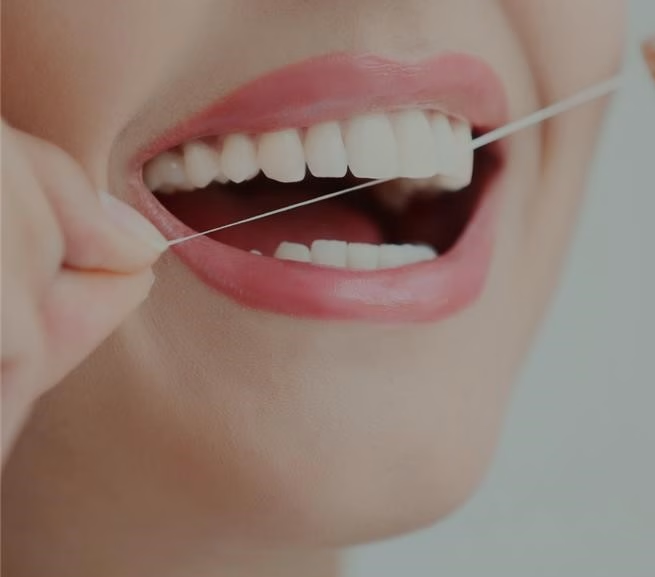
The Importance of Preventive Care in Oral Health An Essential Guide Reviewed by Dr. Kalpesh Patel 5 min Read At Active Dental Prosper, we believe in promoting holistic health by addressing oral health concerns and providing preventive care like Teeth Cleaning in Prosper to maintain a healthy smile. Good oral health plays a critical role in your overall well-being, and preventive measures can help you avoid common dental issues. Oral Hygiene and Overall Wellness: Understanding the Link Poor oral hygiene can have far-reaching effects on your health. Issues like plaque buildup, gum disease, and cavities not only affect your smile but can also contribute to systemic health problems. For example: Inadequate saliva production can leave your mouth vulnerable to bacteria and infections. Weakened immune function can make it harder for your body to fight infections or abnormal cell growth. Poor oral hygiene habits increase the risk of cavities and gum disease. Preventive Dental Care: The Importance of Regular Teeth Cleaning Preventive dental care, such as routine Teeth Cleaning, plays a crucial role in minimizing oral health risks. Regular teeth cleanings help Remove Plaque and Tartar: Plaque buildup can lead to cavities and gum disease if not addressed promptly. Detect Early Signs of Issues: Regular dental checkups allow dentists to identify unusual changes in the mouth early on. Promote Overall Health: Clean teeth and healthy gums reduce the risk of systemic health issues, including heart disease and diabetes. Tips for Protecting Your Oral Health Here are some effective tips to safeguard your oral health: Drink Water Frequently: Consistently sipping water throughout the day helps flush out food particles and maintain a clean, hydrated mouth. Practice Excellent Oral Hygiene: Brush your teeth thoroughly twice a day and floss daily to prevent plaque buildup and maintain gum health. Monitor Your Diet: Limit your intake of sugary and acidic foods to reduce the risk of enamel erosion and cavities. Stay Consistent with Dental Visits: Schedule routine cleanings and exams with Active Dental Prosper to catch potential issues early. Conclusion Maintaining optimal oral health is essential for a brighter, healthier smile and overall wellness. By making informed choices and seeking professional dental care, you can reduce risks and enhance your quality of life. If you’re looking for expert care, schedule your appointment with us today at Active Dental Prosper. Together, we’ll help you achieve your best oral health.
A Comprehensive Guide to Nitrous Oxide Sedation in Pediatric Dentistry
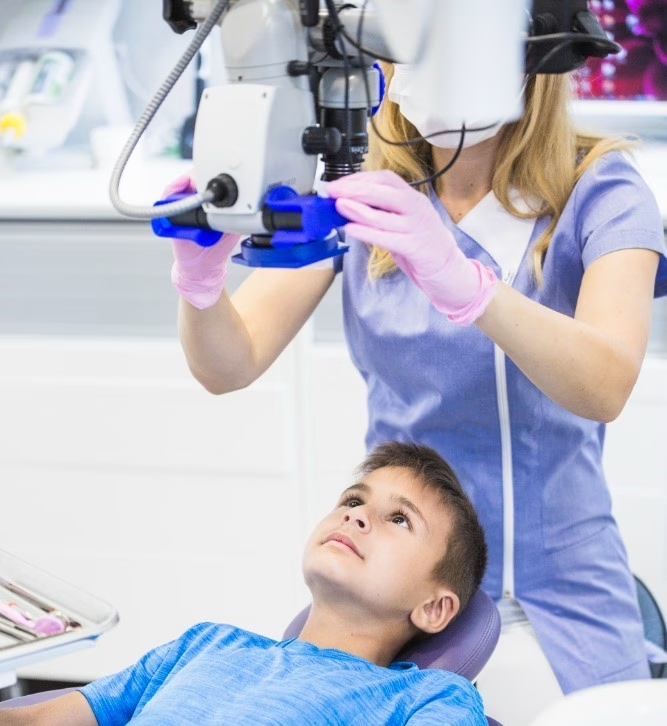
A Comprehensive Guide to Nitrous Oxide Sedation in Pediatric Dentistry Reviewed by Dr. Kalpesh Patel 5 min Read Going to the dentist can be tough for kids, especially if they are scared or anxious. Nitrous oxide sedation, known as “laughing gas,” helps make dental visits easier for children. It’s a safe and gentle method that helps kids relax during their dental work. What is Nitrous Oxide Sedation? Nitrous oxide is a light gas mixed with oxygen that kids breathe in through a small mask. It is called “laughing gas” because it makes kids feel happy and calm. Unlike general anesthesia, nitrous oxide keeps kids awake and aware during their treatment. Why Do Dentists Use Nitrous Oxide for Kids? Reduces Anxiety: Helps nervous kids feel more comfortable. Eases Pain: Lessens any discomfort during procedures. Encourages Cooperation: Helps the dentist work better and faster. Safe for Kids: It’s easy to use and wears off quickly after the visit. How Does It Work? Preparation: The child puts on a small mask to breathe in the gas. Relaxation: The gas works quickly, making the child feel calm. Procedure: The dentist does the dental work while watching the child’s comfort. Recovery: After removing the mask, the effects wear off in minutes, and kids can return to normal activities. Benefits of Nitrous Oxide for Kids Quick Relaxation: Starts working fast to help with anxiety. No Needles: There are no injections or pills involved. Fast Recovery: Kids can go back to their routine right after. Adjusted Dosage: The amount given can be changed to fit the child’s needs. If you’re looking for a reliable Pediatric Dental Prosper, nitrous oxide sedation is one of the many ways we ensure your child has a comfortable dental experience. Is Nitrous Oxide Safe for Kids? Yes, nitrous oxide is very safe when given by trained professionals. we ensure your child’s safety and comfort. Parents should let the dentist know about: Any breathing issues (like asthma). Any allergies or health problems. How the child reacted to past sedation. When is Nitrous Oxide Recommended? Nitrous oxide is great for: Kids who are anxious or scared. Children with a strong gag reflex. Kids need longer or more complicated dental work. Special needs patients who find normal treatments hard. What to Expect After Treatment After the procedure, your child may feel a bit sleepy but will recover quickly. Encourage them to drink water and have a light snack if they want. Nitrous oxide doesn’t have any lasting effects, making it a simple option for sedation. Conclusion Nitrous oxide sedation is a safe and gentle way to help kids feel relaxed at the dentist. By reducing fear and discomfort, it helps children have a positive experience with dental care. If you want your child to have a stress-free dental visit, schedule an appointment with Active Dental Prosper today!
Is Age a Barrier for Dental Implants? Find Out the Truth
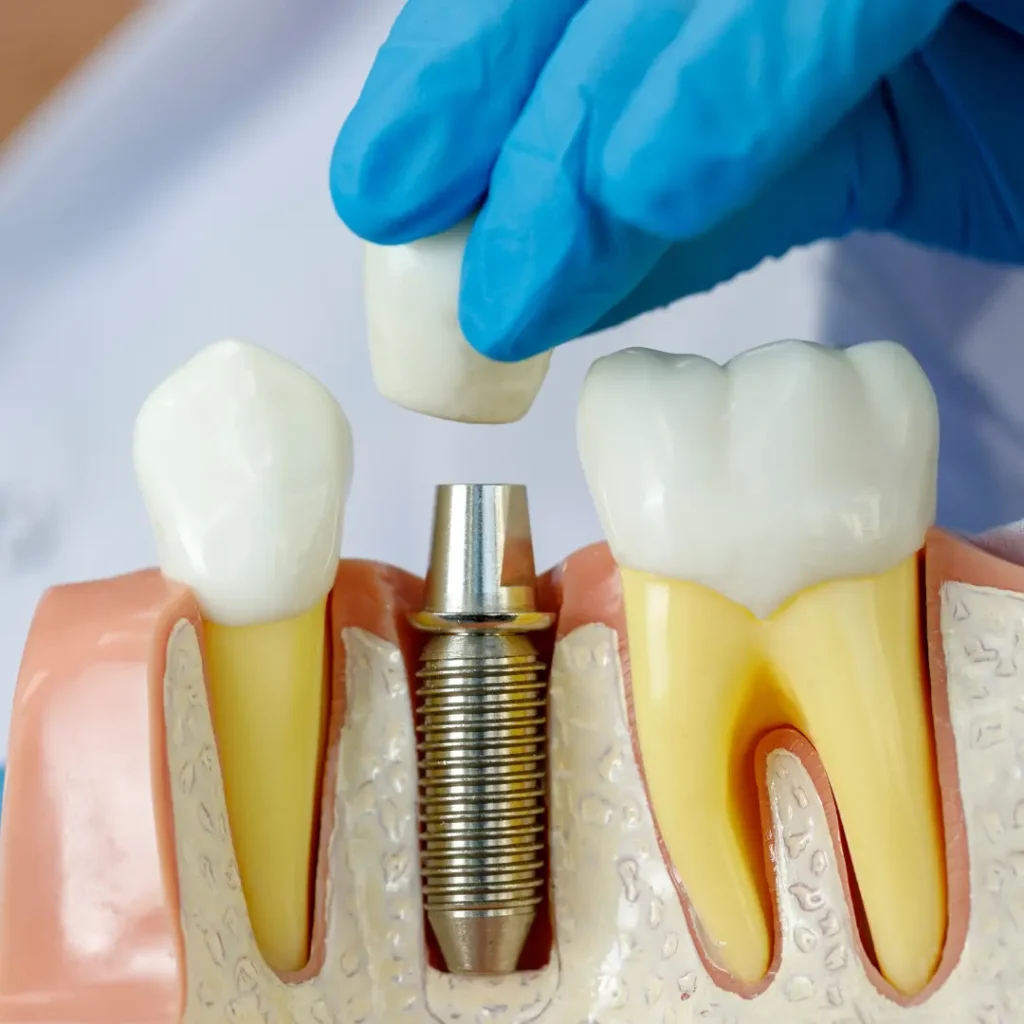
Is Age a Barrier for Dental Implants? Find Out the Truth Reviewed by Dr. Kalpesh Patel 5 min Read While age isn’t a barrier, some age-related factors can influence the procedure’s outcome. Let’s break them down The Role of Lifestyle in Healing Older adults who maintain active lifestyles often heal just as effectively as younger individuals. Staying healthy, eating well, and avoiding smoking can make a big difference. Bone Strength Versus Bone Age It’s not about how old your bones are—it’s about their density. Regular dental check-ups can help your dentist evaluate if bone grafting or alternative procedures are needed to strengthen your jawbone for implants. Medications and Healing As we age, many of us take medications that can impact healing. Blood thinners, for example, might require special considerations during your treatment plan, but they’re rarely a dealbreaker. Innovations in Implant Dentistry The world of dental implants is constantly evolving, and modern advancements are a game-changer for older adults: Zygomatic Implants: For patients with severe bone loss, these implants anchor to the cheekbone, bypassing the need for bone grafting. Digital Implant Planning: Technology now allows for precise, minimally invasive placements, reducing recovery time and enhancing comfort. Aging Gracefully with Dental Implants Older adults often have more at stake when it comes to dental health. Missing teeth can lead to poor nutrition, social discomfort, and even a loss of jawbone density. Here’s how implants help: They Revive Your Confidence: A complete smile can do wonders for self-esteem, making you feel younger and more vibrant. They Prevent Premature Aging: Implants keep your jawbone intact, avoiding the sunken appearance that often comes with tooth loss. They Simplify Life: Forget about removing dentures or messy adhesives. Implants are a hassle-free solution. Conclusion Age isn’t a barrier to achieving the smile you deserve. It’s your overall health, bone condition, and desire for a lasting solution that matter most. At Active Dental Prosper, we specialize in tailoring dental implant solutions to meet the unique needs of each patient—because your age should never limit your options. Schedule a consultation today and take the first step toward restoring your smile—no matter your age. Our team is here to answer your questions and guide you every step of the way

